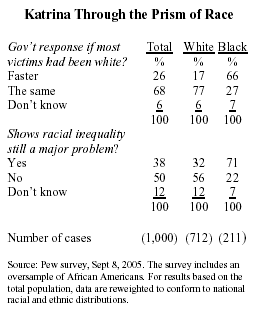 In the wake of Hurricane Katrina, public opinion surveys as well as media reporting portrayed an America deeply divided along racial lines. In an early September Pew survey, for example, two-thirds of African Americans, but fewer than one-in-five whites, said that the government response would have been faster had most victims been white. This raises the question of whether that racial cleavage was primarily the product of Katrina’s special circumstances or whether it reflected and magnified longstanding differences in the way that blacks and whites view government and the larger society. A look back at surveys from earlier years does show enduring black-white differences about the persistence of racial discrimination and the size of the social safety net. However, that review also reveals that on larger social and political values, the cleavage is far smaller and, in some cases, non-existent.
In the wake of Hurricane Katrina, public opinion surveys as well as media reporting portrayed an America deeply divided along racial lines. In an early September Pew survey, for example, two-thirds of African Americans, but fewer than one-in-five whites, said that the government response would have been faster had most victims been white. This raises the question of whether that racial cleavage was primarily the product of Katrina’s special circumstances or whether it reflected and magnified longstanding differences in the way that blacks and whites view government and the larger society. A look back at surveys from earlier years does show enduring black-white differences about the persistence of racial discrimination and the size of the social safety net. However, that review also reveals that on larger social and political values, the cleavage is far smaller and, in some cases, non-existent.
Particularly striking is the congruence on a range of attitudes and opinion that have traditionally been viewed as central to the American creed. For example, black Americans share the general belief in the benefits of hard work—and are equally admiring of those who acquire wealth through it. And while they are far more supportive of government help for the needy than are whites, two-thirds of blacks share the concern that too many low-income people are dependent on government aid.
African Americans are highly patriotic (but more dubious than whites about the efficacy of military force), and are as supportive of efforts to protect the environment and concerned about a concentration of economic power as are whites. And on issues relating to religion and morality, blacks are solidly in the conservative mainstream.
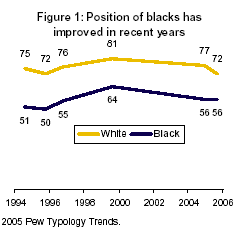 Still, as noted above, there is no question that Hurricane Katrina, with its disproportionate impact on low-income and black individuals, and the greatly exaggerated reports of public disorder in its wake, evoked sharply different reactions among black and white Americans. Surveys of public opinion in the weeks following the storm found large racial divisions in reactions to government preparations for the disaster and the handling of its aftermath.
Still, as noted above, there is no question that Hurricane Katrina, with its disproportionate impact on low-income and black individuals, and the greatly exaggerated reports of public disorder in its wake, evoked sharply different reactions among black and white Americans. Surveys of public opinion in the weeks following the storm found large racial divisions in reactions to government preparations for the disaster and the handling of its aftermath.
In the Pew survey conducted Sept. 6-7, for example, not only were African American respondents far more likely than whites to see a racial dimension in the slowness of the government’s response, but an even higher proportion (71% of blacks compared with 32% of whites) felt that the disaster revealed the persistence of racial inequality. By the same token, 70% of blacks said they felt angry because of events in the storm’s aftermath, compared with 46% of whites.
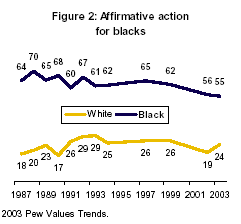 But these are not entirely new developments. A review of the values trend series collected through Pew surveys over the last decade amply demonstrates that on matters relating directly to race, as Katrina and its aftermath came to be viewed, a divergence of opinion along racial lines is a longstanding trait of American public opinion.
But these are not entirely new developments. A review of the values trend series collected through Pew surveys over the last decade amply demonstrates that on matters relating directly to race, as Katrina and its aftermath came to be viewed, a divergence of opinion along racial lines is a longstanding trait of American public opinion.
For example, in Pew’s 2005 Political Typology (based on polling in December 2004), 77% of whites, but only 56% of blacks agreed that the position of blacks in American society has improved in recent years. And while 63% of whites feel that blacks who can’t get ahead are mostly responsible for their own condition, only 43% of blacks agree, a gap that has stayed virtually constant over the last decade.
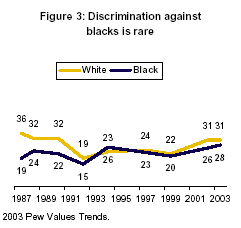 The 2003 Values Survey series reveals a similar disparity on racially charged questions. For example, on the issue of affirmative action programs, 55% of blacks, but only 24% of whites, offered support—although that cleavage has narrowed substantially from a 50-point differential in 1988.1
The 2003 Values Survey series reveals a similar disparity on racially charged questions. For example, on the issue of affirmative action programs, 55% of blacks, but only 24% of whites, offered support—although that cleavage has narrowed substantially from a 50-point differential in 1988.1
Interestingly, no such racial gap is observed when people are asked if they agree that racial discrimination against blacks is rare: Only about three-in-ten among both blacks and whites think that discrimination is an unusual occurrence.
Substantial racial differences are also seen in some, though not all, opinions regarding the roles and responsibilities of government in promoting the general welfare and providing for the common defense.
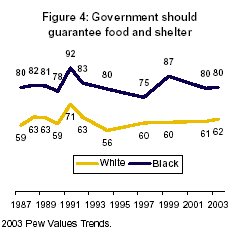 For example, while clear majorities of whites agree that government should do more to help the needy (55% in the 2005 Typology) and guarantee food and shelter (62% in the 2003 Values survey), the numbers of blacks expressing those views are much larger (72% and 80%)—a differential that has remained essentially constant over time.
For example, while clear majorities of whites agree that government should do more to help the needy (55% in the 2005 Typology) and guarantee food and shelter (62% in the 2003 Values survey), the numbers of blacks expressing those views are much larger (72% and 80%)—a differential that has remained essentially constant over time.
And where more than one-in-three whites (36%) in the 2005 survey agreed that “poor people today have it easy because they can get government benefits without doing anything in return,” fewer than half as many blacks (17%) took that view.
Strikingly, however, two-thirds of the black public agreed in the 2003 survey that poor people have become too dependent on government assistance, only 5 percentage points fewer than the number of whites taking that view.
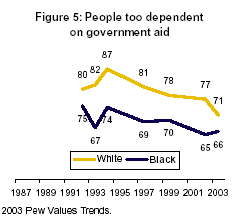 That gap has been narrowing for some years, as fewer whites, but higher numbers of blacks, express concern about dependency.
That gap has been narrowing for some years, as fewer whites, but higher numbers of blacks, express concern about dependency.
While African Americans are somewhat more inclined than whites to see a strong role for government in providing for the needs of citizens, a solid majority of blacks (62%) agree that the federal government should step in only when local government can’t do the job.
With regard to government efficiency, as recently as 2000, blacks were far less inclined than whites to deplore government waste.
Now, perhaps as a result of several years of GOP control over both the White House and Congress, blacks have greater reservations: 53% of blacks now agree that government is “mostly wasteful and inefficient,” scarcely fewer than the 57% of whites who say so.
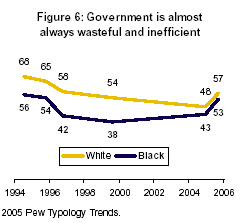 As for government regulation, blacks, as a whole, are considerably more dubious about its efficacy than are whites; nearly half of black respondents say regulation of business does more harm than good, compared with only 40% of white respondents.
As for government regulation, blacks, as a whole, are considerably more dubious about its efficacy than are whites; nearly half of black respondents say regulation of business does more harm than good, compared with only 40% of white respondents.
Skepticism toward government is also seen in the high number of blacks who feel government collects too much information on people (74%) and controls too much of daily life (62%), proportions that are notably higher than the 54% of whites who subscribe to each of these opinions.
Black conservatism is evidenced still more strongly on issues relating to religion and morals. While Americans are, on average, highly religious compared with people in other developed countries, religion is even more central to the lives of black Americans—89% say it is a very important part of their lives compared with 73% of whites.
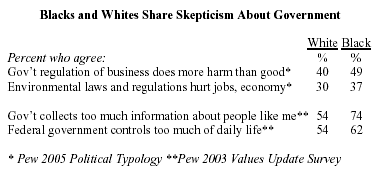
Far higher proportions of blacks than of whites see belief in God as essential to morality (72% vs. 48%). And blacks are also more supportive of government interventions to promote morality and the banning of objectionable books in schools, as well as more disapproving of homosexuality.
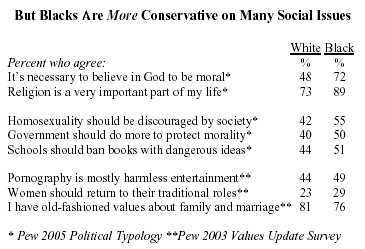 Despite high rates of out-of-wedlock births and single-parent families, about three-infour among the black public subscribe to “old-fashioned” values about family and marriage, only slightly fewer than the 81% of whites who do so. And while only a minority (29%) of blacks favors returning women to their traditional roles, that number is slightly higher than the 23% of whites who endorse such a trend.
Despite high rates of out-of-wedlock births and single-parent families, about three-infour among the black public subscribe to “old-fashioned” values about family and marriage, only slightly fewer than the 81% of whites who do so. And while only a minority (29%) of blacks favors returning women to their traditional roles, that number is slightly higher than the 23% of whites who endorse such a trend.
Most striking is the degree to which blacks and whites share optimism for America, tempered by important concerns. More than 70% of blacks agree, for example, that individuals have it in their own power to succeed, while 62% are confident that hard work will bring success to most people, somewhat smaller proportions than among whites but still substantial. Among both whites and blacks about half see no real limits to the country’s future growth, although blacks are somewhat less confident than whites that America can always find a way out of its problems. And both blacks and whites are close to unanimous in their admiration for people who build a fortune through hard work.
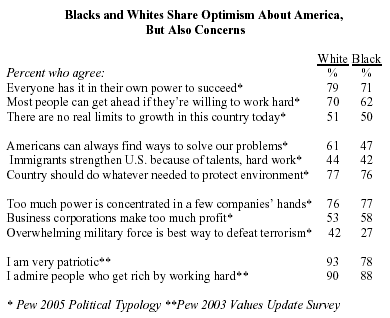 Equal numbers of whites and blacks (44% and 42%) think positively about the contributions of immigrants (though in both cases that is a minority position), and the same high proportions of both races (about three-in-four) support whatever actions are needed to protect the environment. Populist concerns about concentration of corporate power in the society and the profits garnered by corporations are also about equally prevalent among both whites and blacks.
Equal numbers of whites and blacks (44% and 42%) think positively about the contributions of immigrants (though in both cases that is a minority position), and the same high proportions of both races (about three-in-four) support whatever actions are needed to protect the environment. Populist concerns about concentration of corporate power in the society and the profits garnered by corporations are also about equally prevalent among both whites and blacks.
African Americans are considerably more dubious than whites about the effectiveness of military force in combating global terrorism, but patriotism runs strongly through their ranks. Nearly eight-in-ten among the black public say that they are very patriotic, though that high proportion is topped by the nine-in-ten among the white public who profess a high degree of patriotism.
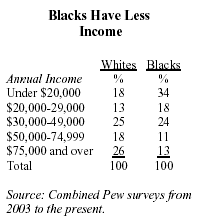 People’s feelings toward the country and attitudes about the appropriate role of government may often be influenced by their own personal circumstances. In polling samples, as in government statistics, blacks tend to have lower incomes than whites. It is thus possible that racial divides on such issues may be attributable, at least in part, to differences in financial situation. However, analysis of Pew polls suggests that while on many issues the income differential does account for some of the observed difference in black and white responses, a racial divide persists irrespective of income.
People’s feelings toward the country and attitudes about the appropriate role of government may often be influenced by their own personal circumstances. In polling samples, as in government statistics, blacks tend to have lower incomes than whites. It is thus possible that racial divides on such issues may be attributable, at least in part, to differences in financial situation. However, analysis of Pew polls suggests that while on many issues the income differential does account for some of the observed difference in black and white responses, a racial divide persists irrespective of income.
When black-white differences are disaggregated by income class, it is apparent that, on many questions, income plays some role in determining attitudes and opinions for both groups—although not always in a parallel manner.
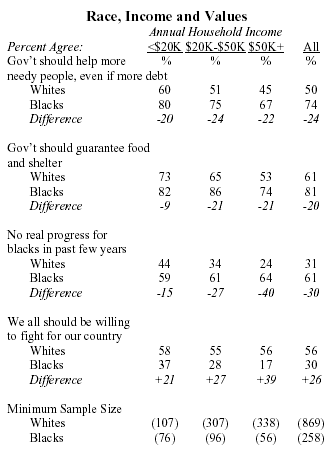 For example, both whites and non-whites with incomes of less than $20,000 are considerably more likely to agree that government should do more to help the needy than are those with higher incomes, although agreement levels are somewhat higher for blacks across the income spectrum.
For example, both whites and non-whites with incomes of less than $20,000 are considerably more likely to agree that government should do more to help the needy than are those with higher incomes, although agreement levels are somewhat higher for blacks across the income spectrum.
The same is true with respect to the obligation of government to assure that every citizen has enough to eat and a place to sleep. However,while whites at lower-income levels are considerably more likely to agree that the position of blacks in American society has not really improved in recent years than are higher-income whites, blacks largely subscribe to that view across the income spectrum. Moreover, while roughly the same number of whites at every income level endorse the belief that Americans should be ready to fight for their country whether it is right or wrong, blacks are not only considerably less likely to agree but the discrepancy increases with income—the most well-off blacks are least likely to agree.
In shaping attitudes, the importance of race, independent of income, is most easily observed by weighting the data by income, effectively equalizing the income distribution across racial groups. As seen in the table, blacks irrespective of income are somewhat more likely to think that the government should do more to help the poor even if that means adding to the government’s budget deficit.
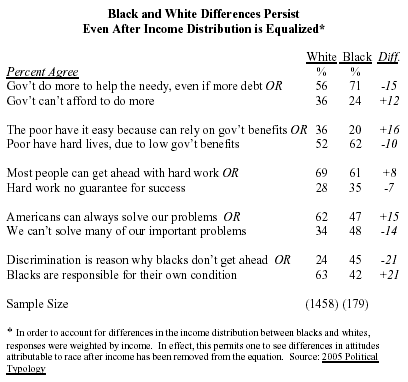 Similarly, even after controlling for income, whites are more likely to believe that people can get ahead in life if they are willing to work hard. With regard to the ability of the larger nation to solve the problems that confront it, there is only a small difference of opinion between whites and nonwhites at lower income levels; higher income whites however, are far more sanguine than blacks with comparable incomes, so that a racial gap remains in the reweighted distribution.
Similarly, even after controlling for income, whites are more likely to believe that people can get ahead in life if they are willing to work hard. With regard to the ability of the larger nation to solve the problems that confront it, there is only a small difference of opinion between whites and nonwhites at lower income levels; higher income whites however, are far more sanguine than blacks with comparable incomes, so that a racial gap remains in the reweighted distribution.
On some issues specifically related to race—such as opinions about the relative contributions of discrimination and personal fault to lower income mobility among blacks, adjusting for income has no effect on the racial gap.
Judging from these data, one might conclude that the racial divide observed in post- Katrina surveys, while revealing enduring attitudinal differences between blacks and white about the role and responsibilities of government, was also heavily influenced by the circumstances and responses particular to the hurricane and its aftermath. Whether this enlarged cleavage will now persist—and translate into disagreements on larger cultural issues where racial differences have been slight or non-existent—remains, of course, an open question.


